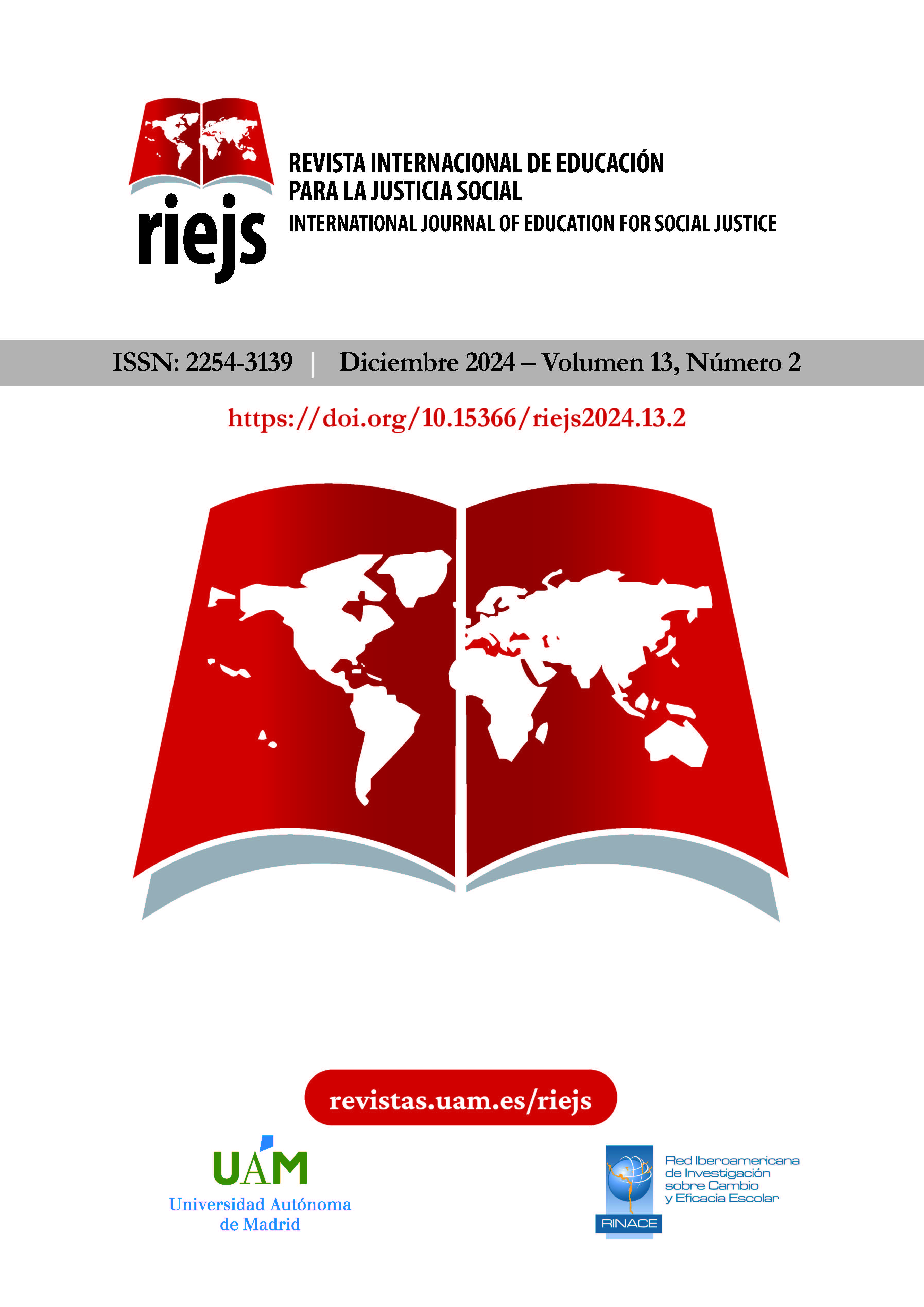Democracy at School: Students’ Conceptions in Spain and Portugal
Keywords:
Democracy, Schools, Students, Youth
This work is licensed under a Creative Commons Attribution-NonCommercial-NoDerivatives 4.0 International License.
Abstract
The aim of the article is to identify and characterize students' conceptions of democracy in public schools in Spain and Portugal. To this end, a phenomenographic study was conducted, involving 30 students – Spain (15) and Portugal (15). Data were collected through phenomenographic interviews. The results suggest two main conceptions of democracy: delegative and participative. In the first, students associate democracy with the election of people to occupy educational positions (management bodies and leadership positions, and student representative structures). In the second, they link democracy to the possibility of direct participation in educational matters by giving opinions, taking part in decisions, or assuming responsibilities in the effective development of actions in daily school life. This study highlights that schools are fertile contexts for democratic learning and reinforces the understanding that students' educational experiences play a fundamental role in shaping a view of democracy.
Downloads
References
Åkerlind, G. (2012). Variation and commonality in phenomenographic research methods. Higher Education Research & Development, 31(1), 115-127. https://doi.org/10.1080/07294360.2011.642845
Arensmeier, C. (2010). The democratic common sense. Young Swedes’ understanding of democracy: Theoretical features and educational incentives. Young, 18(2), 197-222. https://doi.org/10.1177/110330881001800205
Avery, P., Levy, S., Simmons, A., & Scarlett, M. (2012). Adolescents’ conceptions of democracy in Central/Eastern Europe and the United States. Journal of International Social Studies, 2(2), 25-51.
Bardin, L. (2008). Análise de conteúdo. Edições 70.
Bowden, J., & Walsh, E. (2000). Phenomenography. RMIT University Press.
Carr, P. (2008). Educating for democracy: With or without social justice. Teacher Education Quarterly, 35(4), 117-136.
Carr, P. (2011). Does your vote count? Critical pedagogy and democracy. Peter Lang.
Carr, P., & Thésée, G. (2017). Seeking democracy inside, and outside, of education: Re-conceptualizing perceptions and experiences related to democracy and education. Democracy & Education, 25(2), 1-12.
Collin, P. (2008). Young people imagining a new democracy: Literature review. Whitlam Institute.
Collins, J., Hess, M., & Lowery, C. (2019). Democratic spaces: How teachers establish and sustain democracy and education in their classrooms. Democracy and Education, 27(1), Article 3.
Dewey, J. (2002). A escola e a sociedade e a criança e o currículo. Relógio D’Água.
Dewey, J. (2007). Democracia e educação. Didáctica Editora.
Dortins, E. (2002). Reflections on phenomenographic process: Interview, transcription, and analysis. In T. Herrington (Ed.), Research and development in higher education vol. 25: Quality conversations (pp. 207-213). HERDSA.
Dubet, F. (2020). O tempo das paixões tristes. Vestígio.
Flanagan, C., Gallay, L., Gill, S., Gallay, E., & Nti, N. (2005). What does democracy mean? Correlates of adolescents’ views. Journal of Adolescent Research, 20(2), 193-218. https://doi.org/10.1177/0743558404273377
García-Carpintero, A., & Schungurensky, D. (2017). La participación como elemento clave en las escuelas democráticas. Revista Reflexão e Ação, 25(2), 46-83. https://doi.org/10.17058/rea.v25i2.9884
Gillman, A. (2018). Ideals without institutions: Understanding of democracy and democratic participation among Ecuadorian youth. Studies in Comparative International Development, 53, 428-448. https://doi.org/10.1007/s12116-017-9257-7
Helwig, C. (1998). Children’s conceptions of fair government and freedom of speech. Child Development, 69(2), 518-513. https://doi.org/10.1111/j.1467-8624.1998.tb06205.x
López Rupérez, F., & García García, I. (2020). España vs. Portugal en educación: Una aproximación sistémica. Revista Iberoamericana de Educación, 84(1), 193-215. https://doi.org/10.35362/rie8414042
Manzanero, N., & Ramírez, M. (2018). Diálogos sobre educación democrática: Mirada intercultural de la formación de ciudadanos latinoamericanos. Telos, 20(1), 101-115. https://doi.org/10.36390/telos201.06
Marton, F. (1986). Phenomenography: A research approach to investigating different understandings of reality. Journal of Thought, 21(3), 28-49.
Mathé, N. (2019). Democracy and politics in upper secondary social studies students’ perceptions of democracy, politics, and citizenship preparation. [Tese de doutoramento]. Universidade de Oslo.
Mény, Y. (2020). Democracias imperfeitas: Frustrações populares e vagas populistas. Imprensa de Ciências Sociais.
Merkel, W. (2014). Is there a crisis of democracy? Democratic Theory, 1(2). https://doi.org/10.3167/dt.2014.010202
Moreno-Medina, I. (2022). Democracia en la escuela: concepciones de estudiantes de contextos desafiantes y favorables. Revista Lusófona de Educação, 58, 89-103. https://doi.org/10.24140/issn.1645-7250.rle58.05
Murillo, F. J., Hidalgo, N., & Martínez-Garrido, C. (2022). El método fenomenográfico en la investigación educativa. RiiTE Revista Interuniversitaria de Investigación en Tecnología Educativa, 13, 117-137. https://doi.org/10.6018/riite.549541
O’Donnell, G. (1991). Democracia delegativa? Novos Estudos CEBRAP, 31(3), 25-40.
Orth, M., Medeiros, M., & Pereira, G. (2011). Democracia e cidadania na educação escolar. Perspectiva, 35(131), 127-137.
Quaranta, M. (2020). What makes up democracy? Meanings of democracy and their correlates among adolescents in 38 countries. Acta Política, 55, 515-537. https://doi.org/10.1057/s41269-019-00129-4
Ribeiro, N., Malafaia, C., Neves, T., Ferreira, P., & Menezes, I. (2015). Constraints and opportunities for civic and political participation: Perceptions of young people from immigrant and non-immigrant background in Portugal. Journal of Youth Studies, 18(6), 685-705. https://doi.org/10.1080/13676261.2014.992307
Schulz, W., Ainley, J., Fraillon, J., Kerr, D., & Losito, B. (2010). ICSS 2009 international report: Civic knowledge, attitudes, and engagement among lower-secondary school students in 38 countries. IEA.
Stevenson, N. (2018). A educação e a alteridade da democracia. Cadernos de Pesquisa, 48(167), 150-171. https://doi.org/10.1590/198053144668
Trigwell, K. (2000). A phenomenographic interview on phenomenography. In J. Bowden & E. Walsh (Eds.), Phenomenography (pp. 62-82). RMIT University Press.
Üztemur, S., Dinç, E., & Inel, Y. (2018). 8th Year secondary school pupils’ perceptions democratic values: A phenomenological analysis. Bart?n University Journal of Faculty of Education, 7(3), 786-825. https://doi.org/10.14686/buefad.378708
Wenger, E. (1998). Communities of practice: Learning, meaning, and identity. Cambridge University Press.
Zilinsky, J. (2019). Democratic deconsolidation revisited: Young Europeans are not dissatisfied with democracy. Research & Politics, 6(1). https://doi.org/10.1177/2053168018814332

